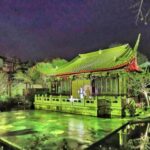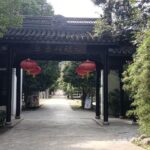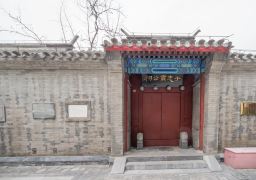In the heart of bustling Gusu, nestled in the private garden at the corner of Pingjiang Road and Da Xinqiao Lane, a sumptuous feast for the senses is about to unfold. A grand banquet by the Gusu River, a testament to cultural heritage, and a conversation between the ancient and the modern, the Tea and Music Theater – “Dreaming Back to Gusu” is now magnificently unveiled.
Embark on a journey to understand and immerse yourself in the refined elegance of Gusu. Inheriting the culture of pavilions, terraces, and verdant landscapes, the Mokai Garden, which captures the universe in a small space, introduces the ‘Tea and Music’ project. This project, focused on cultural preservation and using the garden as a canvas, blends modern technology with the ‘ancestral art of a hundred performances’—Kunqu Opera, and the ‘non-material cultural heritage’—Pingtan, to officially greet everyone.
Savor a pot of Jiangnan fragrant tea, characterized by its tightly rolled leaves with visible white hairs, a silver-green hue, and an alluring jade green sheen, spiraled into a curl, with a fresh and elegant aroma. Biluochun, a thousand-year-old tea produced in Suzhou, is among the top ten famous teas in China. As evening lights begin to twinkle and the silhouettes of trees and people come to life, sipping from a cup allows you to experience the lingering fragrance on your lips, leaving no regrets.

Witness the prosperity of Gusu through the ages; in the past, there was Wu Zixu, who ‘examined the soil and tasted the water, imitating heaven and earth’, and today, ‘Tea and Music’ consults hundreds of classics to meticulously craft a short play that spans a thousand years of Gusu’s history—a feast for the senses awaits you.Kunqu Opera, revered as the ‘ancestral art of a hundred performances’ and one of the oldest forms of traditional Chinese opera, is a treasure of Han Chinese traditional culture. Particularly esteemed in the art of opera, it is often referred to as a ‘lantern flower’ in the hundred gardens. Known for its elegant lyrics, gentle tunes, and delicate performances, Kun Opera was inscribed in the first batch of the national intangible cultural heritage inventory in 2006. Here, you have the unique opportunity to engage in an intimate dialogue with this ancestral art, immersing yourself in the ‘soft language of Wu’ Pingtan. The poetic description of Pingtan captures its essence: “A drop of water that penetrates the ages / Delicate fingers / Gently plucking the tenderness of the strings / Threads of thoughts woven into smooth silk / Dots of emotions brewed into intoxicating wine / The soft language of Wu / Gathered into a gentle stream / … / … / Passing through the ancient streets and alleys of Suzhou / Like the delicacy of a single drop of water / Slowly falling from the simple tiles / Penetrating the frozen layers deep in the ages / Turned into a series of clear Pingtan sounds / Knocking on the dry hearts of many.” The sound of Pingtan is delicate and gentle, likened to “a hundred turns of spring orioles, with lingering sounds around the beams,” and it too was included in the intangible cultural heritage inventory in 2006. Join the editor to experience the cultural baptism that has been passed down for thousands of years.
Mo Kai Garden, known as the ‘private garden,’ is a hidden gem within the city of Suzhou. Dense and sparse at times, it is always a painting, with high and low points that create a scene. It is a quintessential Jiangnan garden, offering a serene and picturesque escape.Mokai Garden, a historical gem, was inducted into the prestigious series of Suzhou gardens by the Suzhou municipal government in July 2018, joining the ranks of the hundred gardens. This place has been a sanctuary for the four talents of the Ming Dynasty, who danced and wrote poetry here, and later became the site of the Qing school. The garden’s rich history spans a long narrative, waiting for you to explore and savor.

Crafting the Auspicious Satchel
In the timeless tradition, the satchel has been a symbol of health and beauty. Here, you have the unique opportunity to create your own satchel, designed and matched by the charming ladies of Suzhou. A helpful tip: you can take your crafted satchel home as a keepsake.

Take home a ‘Fragrant to All’ wooden fan, a simple yet elegant handcraft. Enjoy the Tea Ceremony and Theater performances, as Dream Suzhou wishes you a pleasant life and a joyful journey.
The venue is open year-round, with operating hours from 10:00 to 20:50.
For children, there is a preferential policy: entry is free for those whose height is 1.2 meters or below, not occupying a seat; half price for those whose height is between 1.2 meters and 1.5 meters.









